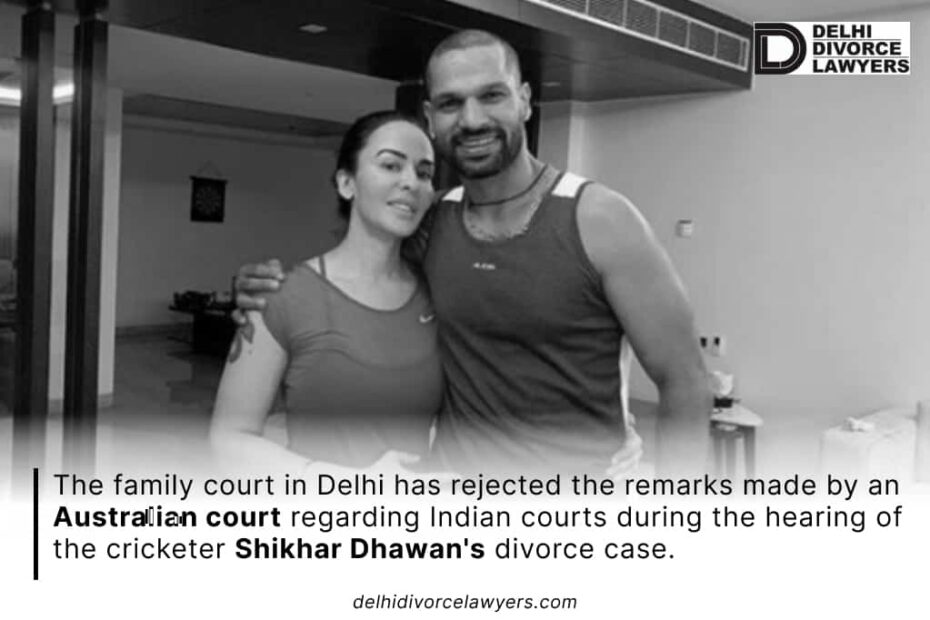Amidst the ongoing cricket matches between India and Australia, a legal battle is underway with a cricketing connection. The Delhi Family Court is hearing the divorce case of Indian cricketer Shikhar Dhawan and his estranged wife Aesha Mukerji. During the hearing, the court criticized an Australian court for its disparaging comments about the Indian judiciary, with Family Court Judge Harish Kumar stating that foreign courts should let go of the notion that Indian courts are still in the pre-independence era.
In a nine-page order, the Family Court Judge Harish Kumar emphasised that Indian courts are utilising video conferencing for conducting proceedings wherever required, indicating that Indian courts have made significant technological advancements since gaining independence in 1947. The judge stated that foreign courts should not harbour misconceptions about the Indian judiciary, believing it to be stuck in the pre-independence era.
The judge’s remarks were in response to the Federal Circuit and Family Court in Australia’s request for Shikhar Dhawan to submit to their jurisdiction and withdraw his divorce proceedings against his wife in Delhi\’s Patiala House Court. Aesha Mukerji, who is based in Melbourne and is a kickboxer, had filed for maintenance in the Australian court, while Dhawan had filed for divorce and custody of their child in the family court in Delhi.
The Australian court’s order, which prompted Judge Harish Kumar’s remarks, had stated its lack of knowledge about the functioning of Indian courts in resolving custody matters and parenting disputes. It suggested that since both parties, Shikhar Dhawan and Aesha Mukerji, were proficient in English, they could continue the litigation in Australia, which uses video conferencing. The order had further directed Dhawan to pursue the divorce and child custody proceedings in the Australian court instead of the Indian court.
The Indian court found fault with the observations made by the Australian court, saying they demonstrated an “inappropriate understanding of the law of India” regarding parenting disputes and conditions in India. According to Judge Kumar, Indian courts prioritize the best interests of the child when making parenting orders. He stated that the Australian court’s assertion that it would have better jurisdiction because it did not know how parenting disputes are determined in India was misguided. The order emphasized that the Australian court’s statement was a reflection of its lack of knowledge of Indian law.
The Indian court further criticized the Australian court’s remarks about the parties being fluent in English and said that it reflected a lack of knowledge of the Indian judiciary. The judge pointed out that almost all courts in India, including those in New Delhi, conduct proceedings in both English and Indian languages. Therefore, the respondent, Aesha, would not have any difficulty in participating in the proceedings in India.
Regarding the territorial jurisdiction, Judge Kumar expressed his opinion that since both Dhawan and Aesha are Hindu, and their son Zoravar is also a Hindu, the divorce and custody proceedings should be pursued in Delhi.
According to the judge, the marriage between Shikhar Dhawan and Aesha Mukerji was conducted in New Delhi under Sikh rites and was registered in India, governed by the Hindu Marriage Act, 1955. As per the judge, any marriage registered under the Hindu Marriage Act in India can only be dissolved under the same act either by Indian courts or foreign courts that have the jurisdiction to apply the act. The judge also observed that Mukerji had not raised any objections to the divorce proceedings under the Hindu Marriage Act and had willingly submitted herself to the jurisdiction of the court under the same act.
The court observed that Mukerji did not have the right to selectively choose the proceedings related to the reliefs under the Hindu Marriage Act, and that the Act applies to all subject matters and issues governed by it. Additionally, the court noted that Mukerji had initially filed a plea before the Australian court for maintenance and financial assistance, and only amended her plea after the family court in Delhi passed orders pertaining to parenting and custody issues.
Source: https://www.barandbench.com/news/litigation/india-vs-australia-family-court-delhi-hearing-shikhar-dhawan-divorce-case-rebuffs-comments-australian-court

